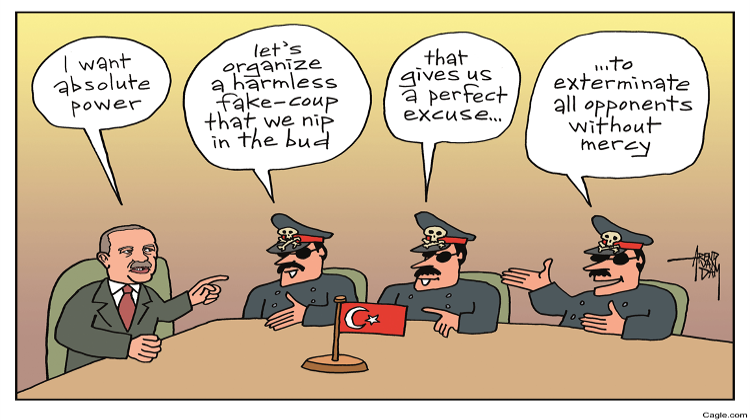by Barry White
The failure of the coup launched by a faction of the military on 15 July has resulted in a massive purge by the Erdogan’s government, while the reckless military adventurism has weakened, possibly fatally, what was left of the country’s democratic framework. In addition it left more than 200 dead and over 1,500 injured, mostly civilians who went onto the streets to resist the coup.
The extent of the witch hunt is staggering: 100 generals arrested – that’s one third of the total; 6,000 military personnel arrested; 9,000 police sacked; 3,000 judges suspended, while yesterday afternoon (19 July) the BBC reported that that over 15,000 education staff had been suspended and the resignation of more than 1,500 university deans had also been ordered by Turkey’s high education board. The ministry of education accused the education staff of having links to Fethullah Gulen, a US-based Islamic cleric and one time Erdogan supporter, who the Turkish government says was behind Friday’s uprising. The licences of 21,000 teachers working in private institutions have also been revoked.
President Erdogan was quick to lay the blame for the attempted coup on him and the president’s acolytes have taken up the hue and cry across civic society. Mr. Gulen denies the charge and has condemned the attempted coup.
Journalists also suffered, at least one with his life. According to the European Federation of Journalists, Mustafa Cambaz, photojournalist for the Turkish daily Yeni Safak was killed by soldiers during the attempt coup in Turkey, on Friday night, in the Cengelkoy neighbourhood of Istanbul. Soldiers also took control for a while of the state broadcaster TRT, the private broadcasters CNN-. Turk and Kanal D, and the daily newspaper Hurriyet. In the Ankara studios of TRT, news anchor Tijen Karas was forced by coup soldiers to read a statement at gunpoint. Several journalists were attacked during the clashes. “In Istanbul, civilians protesting the coup beat Selçuk Şamiloğlu, a photojournalist for Hurriyet and the Associated Press,” quote the EFJ.
Yesterday, Turkey’s media regulatory body revoked the licences of 24 radio and TV channels accused of having links to the Gulen movement, giving the state virtual control of all but a few media outlets. Erdogan was also quick to respond to demands for the reintroduction of the death penalty abolished in 2004 as part of its bid to join the EU, by refusing to rule it out. In response the EU said that if it were to be reintroduced it would end accession talks between the parties. That does not seem to bother Erdogan at the moment.
In the short term there is only one beneficiary of these tragic events, President Erdogan, who will be calculating that his changes of winning a referendum on his demands to become a president with executive powers look a lot better than they did a week ago!
Meanwhile in another twist to a confused picture, yesterday’s Hurriyet Daily News reported that the army first received intelligence a coup was under way on Friday, some hours before soldiers deployed tanks and targeted key infrastructure. According to the BBC “The General Staff said in a statement it alerted the relevant authorities, adding that the majority of members had nothing to do with the coup.”
Just who knew what and when is still unclear, but certainly the present beneficiary is President Erdogan. Our answer must be a strong show of solidarity with those defending critical voices and democractic values.
Meanwhile Amnesty International released the following statement today (20 July): As the sweeping crackdown in Turkey following a failed coup continues, Amnesty International fears that purges are being extended to censor media houses and journalists, including those critical of government policy.
“We are witnessing a crackdown of exceptional proportions in Turkey at the moment. While it is understandable, and legitimate, that the government wishes to investigate and punish those responsible for this bloody coup attempt, they must abide by the rule of law and respect freedom of expression,” said Andrew Gardner, Amnesty International’s Turkey researcher.
“Turkey’s people are still reeling from the shocking events of the weekend and it is vital that press freedom and the unhindered circulation of information are protected, rather than stiffled.”
Amnesty International has learned that the authorities arbitrarily blocked access to more than 20 news websites in the days following the coup attempt. Yesterday it was widely reported that the government revoked the licenses of 25 media houses in the country. In addition, 34 individual journalists have had their press cards cancelled and at least one journalist has had an arrest warrant issued against her for her coverage of the attempted coup.
Amnesty International is calling on the Turkish authorities to respect human rights and not arbitrarily restrict freedom of expression.
ends

Leave a Reply